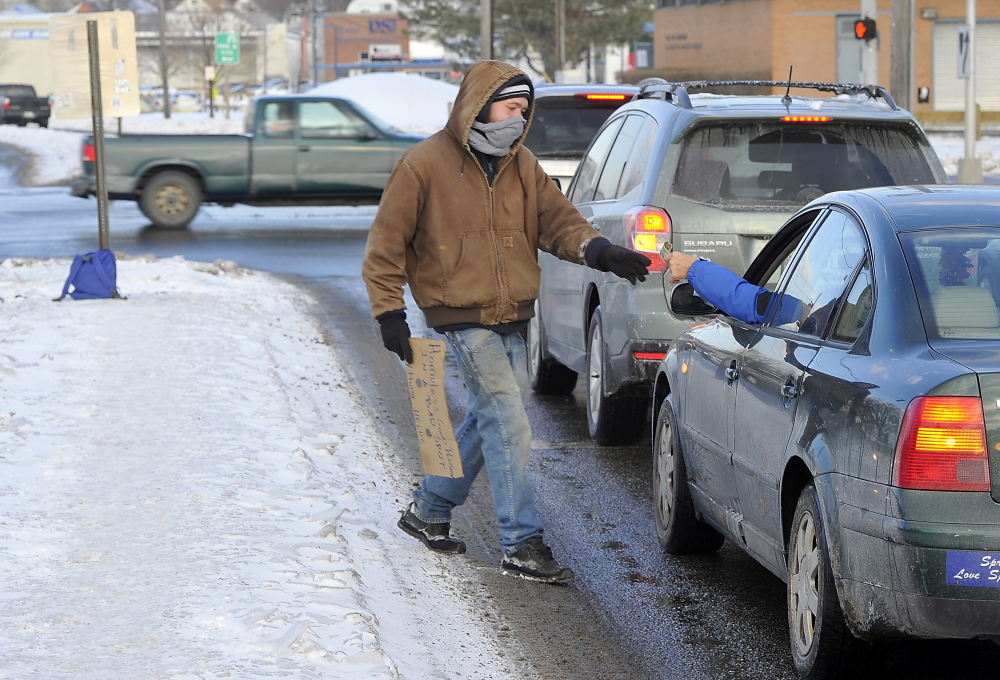BOSTON — A Portland ordinance that banned panhandlers from standing in street medians was necessary for safety reasons and was never aimed at limiting free speech, a lawyer for the city argued Friday in appealing a lower court ruling that overturned the law.
The city made the argument in asking the 1st U.S. Circuit Court of Appeals to reverse last year’s ruling in federal District Court in Maine. That decision struck down the ordinance prohibiting anyone from standing, sitting or staying in medians that separate vehicle traffic at intersections.
The federal judge in Maine ruled the ordinance was unconstitutional because it interfered with people’s right to free speech, whether they held protest banners or handwritten cardboard slabs asking for handouts.
“It didn’t matter to the city whether you were engaging in speech-related activities or non-speech-related activities. It’s dangerous,” said Jennifer Thompson, one of two city attorneys representing Portland in the appeal.
Kevin Martin, a lawyer representing three Portland residents who successfully challenged the city’s ordinance, argued that the district judge’s ruling should be upheld, saying the city’s measure went too far.
“Medians are not all death traps,” said Martin, of the Boston-based law firm Goodwin Proctor. He was joined by the American Civil Liberties Union of Maine in arguing against the city’s appeal.
The attorneys argued their cases before a panel of three judges at the Boston appellate court Friday, by coincidence the same day the U.S. Supreme Court was considering whether to hear arguments in a similar case in Worcester, Massachusetts, in which that city was allowed to ban panhandling in medians.
Martin also represents opponents of Worcester’s ban on median panhandling.
While the district judge in Maine struck down Portland’s ban after a trial, the district judge in the Massachusetts case rejected a motion filed by Martin to remove Worcester’s median ban prior to a trial being held.
WORCESTER CASE MAY APPLY
One of the three members on the appellate court panel, Judge Jeffrey Howard, asked Thompson whether she objected to delaying any decision on Portland’s appeal until after the U.S. Supreme Court decides whether to take up the Worcester case.
“I wonder whether it makes sense for us to hold this in abeyance until we get some guidance,” Howard said.
Thompson said she had no objection to delaying the decision on the appeal, since the city has already agreed to refrain from enforcing the ordinance while the case is pending. In the meantime, panhandling on street medians has remained a common practice in Portland.
The 1st U.S. Circuit Court of Appeals has ruled already in the Worcester case, allowing its median ban to remain in effect.
The U.S. Supreme Court could decide as early as Monday whether to take up the Worcester case, send it back to the District Court judge in Massachusetts to reconsider, or send it to the Office of the U.S. Solicitor General for an opinion.
While Thompson said she sees the Worcester case as setting a legal precedent that makes Portland’s appeal more likely to succeed, both sides agreed there are some differences in the two cases The Portland case, for example, has already been decided with a trial, and its ordinance allows people to continue putting political signs in median spaces. The decisions in the Worcester case were all made before trial.
SPEECH TRUMPED SAFETY CONCERNS
“(The Portland) case was decided after a full trial that received numerous concessions by witnesses that it is not always dangerous to stand in the median. That was not the case in the Worcester case,” Martin said. “The Worcester case is, in a way, neither here nor there.”
The Portland City Council passed the ordinance in July 2013 after city officials primarily expressed safety concerns about panhandlers walking or stumbling into traffic.
The ordinance, which took effect that August, was challenged in federal court by the ACLU of Maine and Goodwin Procter, which represented the three residents, Wells Staley-Mays and Michael Cutting, two political activists; and Alison Prior, who has stood on medians holding a sign asking for money. The plaintiffs argued that the ban was an unconstitutional restriction of free speech.
The city agreed not to enforce the ordinance until the court issued a final ruling.
ROLE OF MEDIANS QUESTIONED
Both sides presented their arguments during a one-day trial in U.S. District Court in November 2013, and Judge George Singal ruled last February that the ordinance was unconstitutional.
On Friday, another member of the appellate court panel, Judge David Barron, questioned whether the medians in Portland were ever used for activities other than free speech, such as for soccer or Frisbee games, to which Thompson answered no.
“I don’t see what non-speech activities we would be cutting off,” Barron said. “That’s the only reason people would bother going into the median strip we’re talking about.”
The appeals court set no timetable on when it would issue a decision on Portland’s appeal.
Copy the Story LinkSend questions/comments to the editors.



Success. Please wait for the page to reload. If the page does not reload within 5 seconds, please refresh the page.
Enter your email and password to access comments.
Hi, to comment on stories you must . This profile is in addition to your subscription and website login.
Already have a commenting profile? .
Invalid username/password.
Please check your email to confirm and complete your registration.
Only subscribers are eligible to post comments. Please subscribe or login first for digital access. Here’s why.
Use the form below to reset your password. When you've submitted your account email, we will send an email with a reset code.